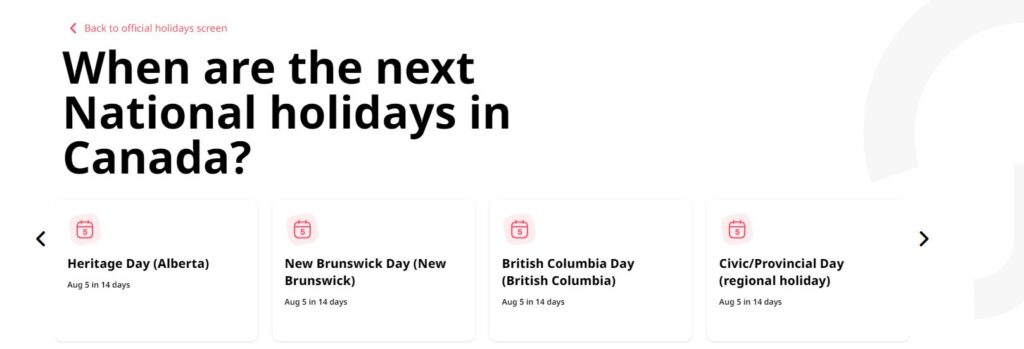Table of Contents
ToggleCivic Holiday 2024, observed on the first Monday of August, is a significant event in Canada that allows citizens to enjoy a long weekend filled with festivities, relaxation, leave management, and community activities. Civic Holiday 2024 will fall on August 5th, providing Canadians with a much-needed mid-summer break. Though it is not a statutory holiday across the country, it holds considerable cultural and social importance, with various provinces and municipalities recognizing and celebrating it in unique ways.
Civic Holiday is not a statutory holiday across Canada, and its recognition varies by province and territory. This means that for many workers and students, whether or not they get the day off depends on where they live. Here’s a detailed breakdown:
Take a Look at Canada’s Official Holidays From Here

Provinces and Territories Where Civic Holiday is an Official Holiday
- Alberta (Heritage Day): It is a civic holiday, meaning it’s generally observed by most people, though not all workers are guaranteed a day off.
- British Columbia (British Columbia Day): It is a statutory holiday, so most workers and students do get the day off.
- New Brunswick (New Brunswick Day): It is a statutory holiday, with most people getting the day off.
- Northwest Territories (Civic Holiday): It is a statutory holiday here as well.
- Nunavut (Civic Holiday): Observed as a public holiday.
- Ontario (Simcoe Day in some cities): Not a statutory holiday across the province, but widely observed as a civic holiday. Many businesses close, but it’s not guaranteed for all workers.
- Prince Edward Island (Natal Day): Generally observed as a holiday, though not statutory.
- Saskatchewan (Saskatchewan Day): It is a statutory holiday, so most people get the day off.
Provinces and Territories Where Civic Holiday is Not Officially Recognized
- Manitoba (Terry Fox Day): Not a statutory holiday, though widely observed as a civic holiday.
- Quebec: Civic Holiday is not generally recognized.
- Yukon: Does not have a specific Civic Holiday.
- Newfoundland and Labrador: Civic Holiday is not officially recognized.
Impact on Workers and Schools
Workers: In provinces where Civic Holiday 2024 is a statutory holiday, most workers are entitled to a day off with pay. In places where it’s a civic holiday, businesses may close, but it’s not legally required, so some workers might still need to work.
Schools: Since Civic Holiday falls during the summer, schools are not in session, so students typically don’t attend school regardless of the holiday status.
Historical Background
The origins of Civic Holiday can be traced back to the 19th century. Initially, it was established to give workers a break during the summer. Over time, it has evolved to honor local history, community spirit, and cultural heritage. Each province and territory has its own name and specific traditions associated with the holiday. For instance, in Toronto, it is known as Simcoe Day in honor of John Graves Simcoe, the first Lieutenant Governor of Upper Canada. In Alberta, it is referred to as Heritage Day, celebrating the province’s rich cultural diversity.
Celebrations Across Canada
Civic Holiday celebrations vary widely across the country, reflecting the diverse cultural tapestry of Canada. Here’s a glimpse into how different regions might celebrate this day:
- Ontario (Simcoe Day): In Ontario, particularly in Toronto, Simcoe Day is marked with various events and activities that highlight the historical contributions of John Graves Simcoe. Parades, historical reenactments, and educational programs are common, providing both entertainment and a chance to learn about local history.
- Alberta (Heritage Day): Alberta’s Heritage Day is a vibrant celebration of the province’s multicultural heritage. Festivals showcasing traditional music, dance, crafts, and cuisine from various cultural communities are held in cities like Edmonton and Calgary. It’s a day for Albertans to celebrate their diverse roots and the contributions of different ethnic groups to the province’s development.
- British Columbia (British Columbia Day): In British Columbia, Civic Holiday is known as British Columbia Day. The day is often spent enjoying the natural beauty of the province with outdoor activities such as hiking, camping, and beach outings. Communities across the province host events like local fairs, concerts, and fireworks, bringing people together to celebrate their shared identity.
- Saskatchewan (Saskatchewan Day): Saskatchewan Day is celebrated with a focus on family and community. Many towns and cities organize picnics, sports events, and community fairs. It’s a time for residents to come together, enjoy each other’s company, and participate in communal activities that strengthen social bonds.
- Manitoba (Terry Fox Day): In Manitoba, Civic Holiday is dedicated to Terry Fox, a national hero known for his Marathon of Hope, which aimed to raise awareness and funds for cancer research. Events honoring Terry Fox’s legacy, such as charity runs and walks, are held to continue his mission of hope and perseverance.
Significance of Civic Holiday
Civic Holiday serves multiple purposes beyond just providing a break from work. It’s a day that fosters community spirit, encourages cultural appreciation, and promotes historical awareness. The holiday also has economic benefits, as local events and festivals boost tourism and local businesses.
FAQs About Civic Holiday 2024 and Work Life
1. Is Civic Holiday a paid day off for all workers in Canada?
- No, Civic Holiday is not a statutory holiday across all of Canada. Whether workers receive a paid day off depends on the province or territory they are in. For example, British Columbia and Saskatchewan recognize it as a statutory holiday, meaning most workers are entitled to a paid day off, while in Ontario, it is widely observed but not guaranteed for all workers.
2. How can I find out if I get the day off on Civic Holiday?
- You should check with your employer and review your local regulations. Workplace policies and regional laws will dictate whether you receive the day off. In provinces where Civic Holiday is a statutory holiday, you are more likely to have a paid day off.
3. Are businesses required to close on Civic Holiday?
- Not necessarily. In regions where Civic Holiday is a statutory holiday, many businesses will close or operate on reduced hours. However, in areas where it is not a statutory holiday, businesses may choose to remain open, and workers may be required to work as usual.
4. Do all government offices and services close on Civic Holiday?
- In provinces and territories where Civic Holiday is a statutory holiday, government offices and services typically close. In other areas, it varies, so it’s best to check with local government offices for specific closures.
5. How does Civic Holiday affect employees who work on the holiday?
- In regions where Civic Holiday is a statutory holiday, employees who work on the holiday are usually entitled to holiday pay, which may be time-and-a-half or double their regular rate, depending on local labor laws. In other areas, regular pay may apply unless company policy states otherwise.
6. Can an employer deny a request for time off on Civic Holiday?
- In provinces where Civic Holiday is not a statutory holiday, employers can deny time-off requests based on business needs. However, in regions where it is a statutory holiday, employees are generally entitled to the day off unless their role is considered essential.
7. Are there any special considerations for part-time workers regarding Civic Holiday?
- Yes, part-time workers may have different entitlements based on local labor laws. In provinces with statutory holiday recognition, part-time employees are often eligible for holiday pay if they meet certain criteria, such as having worked a minimum number of days before the holiday.
8. What should I do if I believe I’m entitled to the day off but my employer disagrees?
- If you believe you are entitled to the day off or holiday pay and your employer disagrees, you should first review your employment contract and local labor laws. If the issue remains unresolved, consider contacting your local labor board or employment standards office for guidance.
9. How do retail workers typically handle Civic Holiday?
- Retail workers’ schedules on Civic Holiday 2024 depend on local laws and company policies. In provinces where Civic Holiday is a statutory holiday, retail workers might receive holiday pay or time off. In other regions, they may work regular hours with standard pay unless otherwise specified by their employer.
10. Does Civic Holiday impact school schedules?
- Since Civic Holiday falls during the summer, schools are generally not in session. Therefore, it does not impact school schedules directly, but it does offer families an opportunity for summer activities and trips.
Conclusion
The status of Civic Holiday 2024 varies significantly across Canada. In provinces where it is a statutory holiday, workers and students can expect a day off. However, in other areas, the day might be observed as a civic holiday without the guarantee of a break from work. It’s always best to check local regulations and workplace policies to determine how Civic Holiday is recognized in your specific area.
